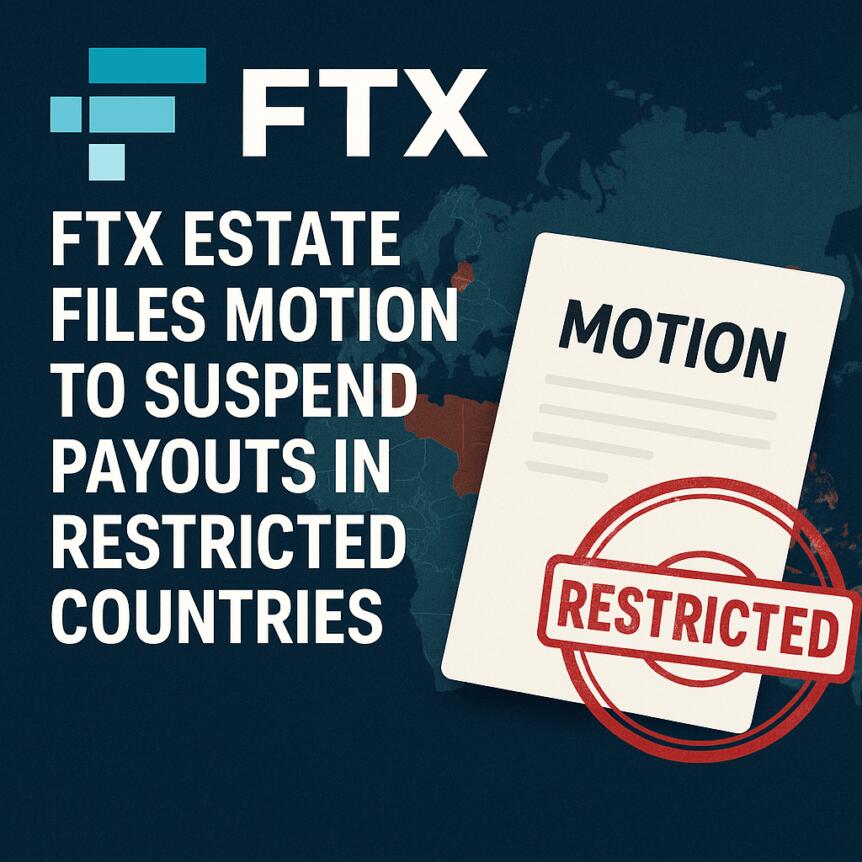FTX Estate Files Motion to Suspend Payouts in Restricted Countries

Here’s the rewritten article with an engaging introduction, key takeaways, and a polished, professional tone for a reputable publication:
FTX Recovery Trust Withdraws Motion to Restrict Payouts in Certain Foreign Jurisdictions Amidst Creditor Pushback
The ongoing efforts to resolve the collapse of the once-prominent crypto exchange FTX have seen a significant development. The FTX Recovery Trust has decided to withdraw a recent legal motion that aimed to limit creditor disbursements in countries with potentially restrictive cryptocurrency laws, such as China and Russia. This move marks a cautious step forward in the complex process of recovering assets for distressed crypto investors.
- The FTX Recovery Trust has withdrawn its motion to restrict payouts in certain foreign jurisdictions, including China and Russia.
- The decision follows widespread objections from creditors and legal challenges to the original motion.
- Remaining uncertainties persist for creditors expecting to recover losses amid ongoing crypto market volatility.
- Experts warn that crypto bankruptcies could set dangerous precedents affecting trust in the global blockchain ecosystem.
- Critics highlight that FTX payout values may be substantially lower than anticipated due to fiat-based disbursements.
The bankruptcy estate of FTX, the now-defunct cryptocurrency exchange, has officially abandoned a motion that sought to contain creditor payouts within certain “potentially restricted foreign jurisdictions.” Filed earlier this year, the motion aimed to allow the court to implement measures restricting disbursements to countries like China, Saudi Arabia, Russia, and Ukraine, citing complex or restrictive local crypto regulations.
In a notice released Monday, the FTX Recovery Trust indicated that it would no longer pursue the request. Instead, if they revisit the motion in the future, they will submit a new application in accordance with legal procedures, emphasizing that the withdrawal is made without prejudice.
Do not celebrate too early, creditor warns
While the withdrawal is a noteworthy victory for many creditors, some advisors caution against premature celebration. Weiwei Ji, a creditor known as Will on social media, expressed that the move is a positive development but urged stakeholders to remain vigilant until full recovery is achieved. “This is a victory for affected creditors. But until full compensation is received, stay alert and continue to collaborate,” Ji commented.
Source: Sunil KavuriThe withdrawal follows a wave of objections from creditors—over 70 filings in bankruptcy court—highlighting widespread concerns about the original motion. Critics argue that opening the door for restricted payouts could undermine trust in the broader crypto ecosystem, with implications for future bankruptcy proceedings involving digital assets.
During the summer, Ji warned that court approval of such restrictive measures might **set a dangerous precedent, harming the integrity of global crypto markets**. Sunil Kavuri, a leading FTX creditor representative, also expressed skepticism regarding the payout values. He noted that, since distributions are primarily made in fiat currency, the actual crypto losses for creditors could be much higher than the official numbers suggest.
As the legal saga unfolds, industry watchers remain cautious. The ongoing uncertainty underscores the importance of transparent regulations and clear legal standards to protect investors and stabilize the rapidly evolving blockchain and crypto markets.
This article was originally published as FTX Estate Files Motion to Suspend Payouts in Restricted Countries on Crypto Breaking News – your trusted source for crypto news, Bitcoin news, and blockchain updates.
You May Also Like

Franklin Templeton updates XRP ETF filing for imminent launch

Fed Lowers Rates By 25bps: How Bitcoin And Crypto Prices Responded And What’s Next

Canada’s budget promises laws to regulate stablecoins, following US
Canada’s government unveiled a plan to regulate stablecoins, requiring fiat-backed issuers to maintain sufficient reserves and adopt robust risk management measures. Canada is set to introduce legislation regulating fiat-backed stablecoins under its federal budget for 2025, following the footsteps of the US, which passed landmark stablecoin laws in July.Stablecoin issuers will be required to hold sufficient reserves, establish redemption policies and implement various risk management frameworks, including measures to protect personal and financial data, according to the government’s 2025 budget released on Tuesday.The Bank of Canada would allocate $10 million over two years, starting in the 2026-2027 fiscal year, to ensure everything runs smoothly, followed by an estimated $5 million in annual costs that will be offset from stablecoin issuers regulated under the Retail Payment Activities Act.Read more